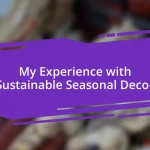Key takeaways:
- The exploration of plant-based plastics revealed their potential to reduce reliance on fossil fuels and contribute positively to the environment.
- Although challenges like durability, availability, and recycling exist, increasing consumer awareness and demand can drive improvements and acceptance of plant-based alternatives.
- The future of plant-based plastics looks promising with ongoing innovations aiming to enhance durability and integrate better into recycling systems, fostering a sustainable transition.
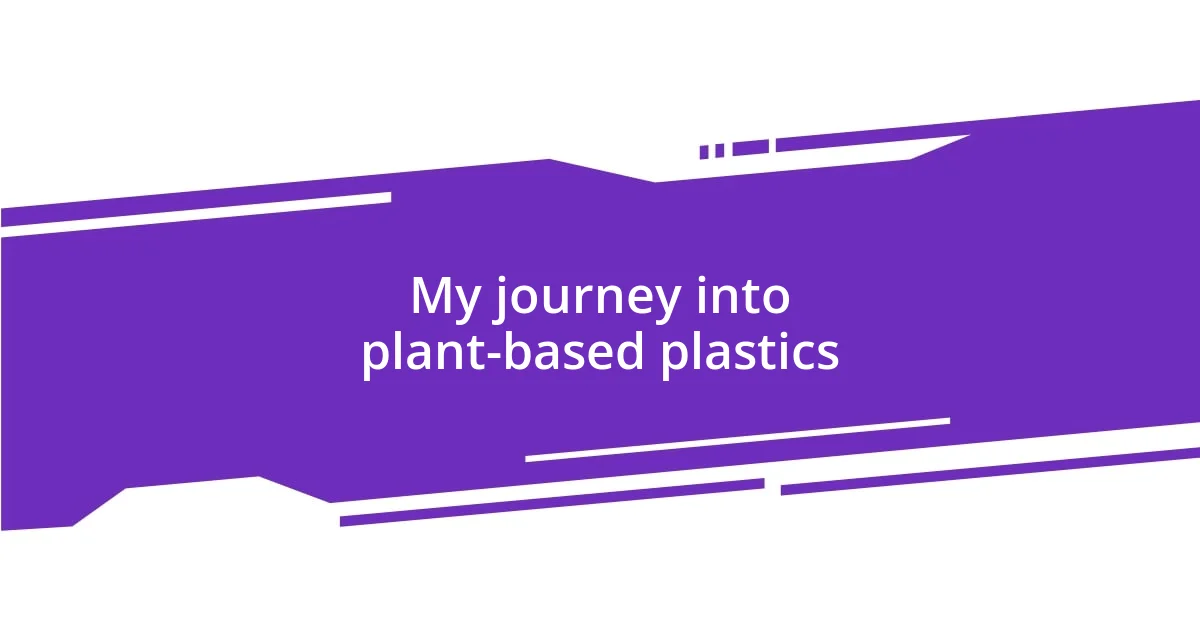
My journey into plant-based plastics
When I first stumbled upon the concept of plant-based plastics, it felt like I was discovering a hidden gem in the vast world of sustainability. I remember sitting in a workshop, feeling a mix of curiosity and skepticism when the speaker explained how these materials could help reduce our reliance on fossil fuels. Could this really make a difference? That question lingered in my mind long after the session ended.
As I began to explore plant-based plastics more deeply, I was surprised by how many everyday products could be made from renewable resources. I vividly recall switching to a brand of biodegradable utensils during a birthday party—seeing my friends’ curiosity sparked a lively discussion about the potential of these materials. It was then that I realized how passionate I had become about this topic.
There’s something incredibly fulfilling about choosing products that not only serve a purpose but also contribute positively to our environment. I found myself gravitating toward plant-based alternatives, and I often contemplate how simple choices can lead to significant changes. Have you considered what small steps you could take in your own life? I can assure you; it’s a rewarding path to embark on.
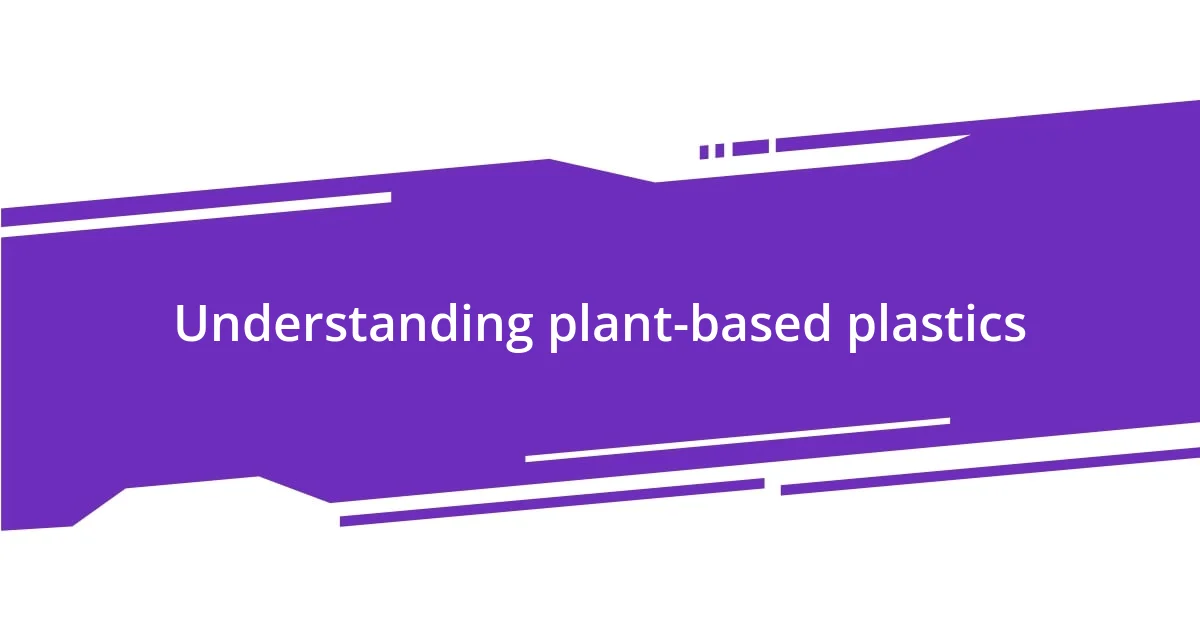
Understanding plant-based plastics
Understanding plant-based plastics involves delving into their origins and the innovations behind them. When I first learned that these materials are derived from natural resources like corn, sugarcane, and even potatoes, it was eye-opening. It broke the stereotype I had about plastics being solely reliant on petroleum. The transformation from simple crops to functional items seemed magical to me, especially when I considered how everyday products could play a role in diminishing environmental impact.
- Plant-based plastics are often biodegradable and compostable, breaking down more quickly than traditional plastics.
- They can reduce greenhouse gas emissions by utilizing renewable resources.
- Many of these plastics have similar performance characteristics to petroleum-based counterparts, making them suitable for a variety of applications.
I remember the first time I unwrapped a plant-based phone case. It felt great to know that by choosing it, I was supporting sustainable manufacturing processes. That moment filled me with hope, as it reinforced my belief that making eco-friendly decisions doesn’t have to mean sacrificing quality. Instead, it can lead to products that are both functional and kind to our planet.
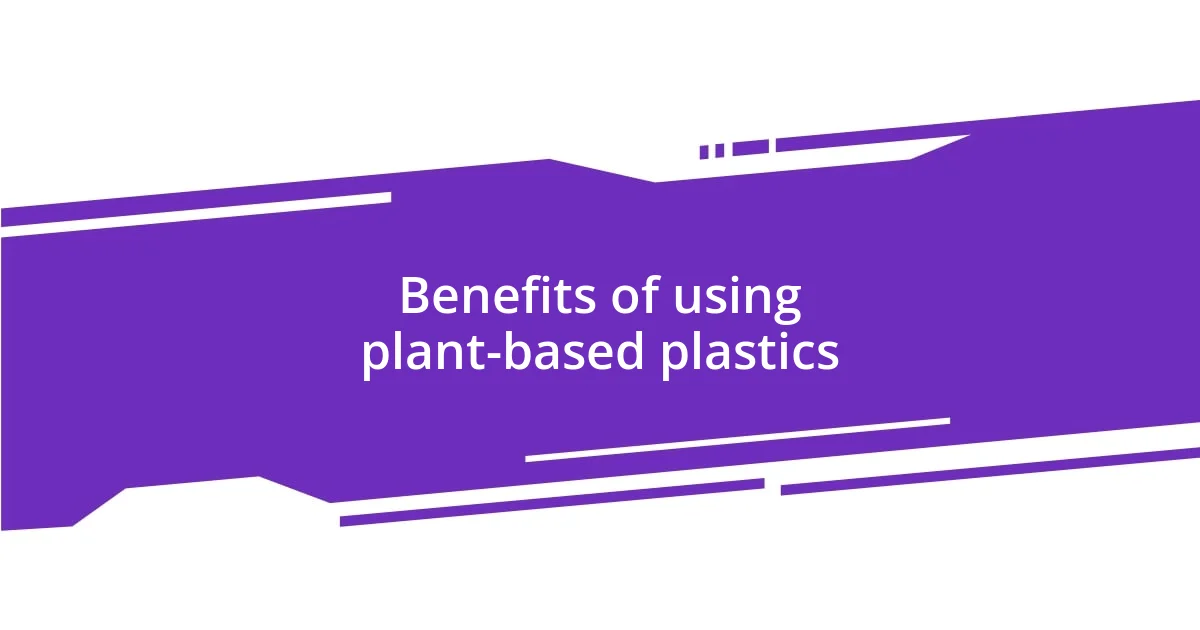
Benefits of using plant-based plastics
Using plant-based plastics brings numerous benefits that can lead to a more sustainable future. For instance, I have experienced firsthand the satisfaction of using biodegradable bags during my grocery runs. Seeing them break down naturally instead of polluting the environment has been exceptionally gratifying. It’s not just about reducing waste; it’s about being part of a collective effort to leave the planet in a better state for future generations.
Another significant advantage is their role in lowering carbon footprints. I once attended a seminar focused on sustainability, where the speaker highlighted that plant-based plastics can cut greenhouse gas emissions by up to 75% compared to traditional plastics. This realization struck a chord with me; understanding that my small choices could contribute to a larger impact was empowering. It motivated me to incorporate more plant-based alternatives in my daily life.
Lastly, transitioning to plant-based plastics can stimulate local economies, particularly in agriculture. I remember chatting with a friend who works in sustainable farming. He explained how the demand for these materials can support farmers, creating new markets for crops that would otherwise go unused. It reinforced my belief that embracing these materials fosters not just environmental benefits, but also social and economic advancements.
| Benefit | Description |
|---|---|
| Biodegradability | Break down more quickly than traditional plastics, reducing waste in landfills. |
| Carbon Emissions | Lower greenhouse gas emissions by utilizing renewable resources. |
| Economic Growth | Supports local farmers and stimulates agricultural markets. |
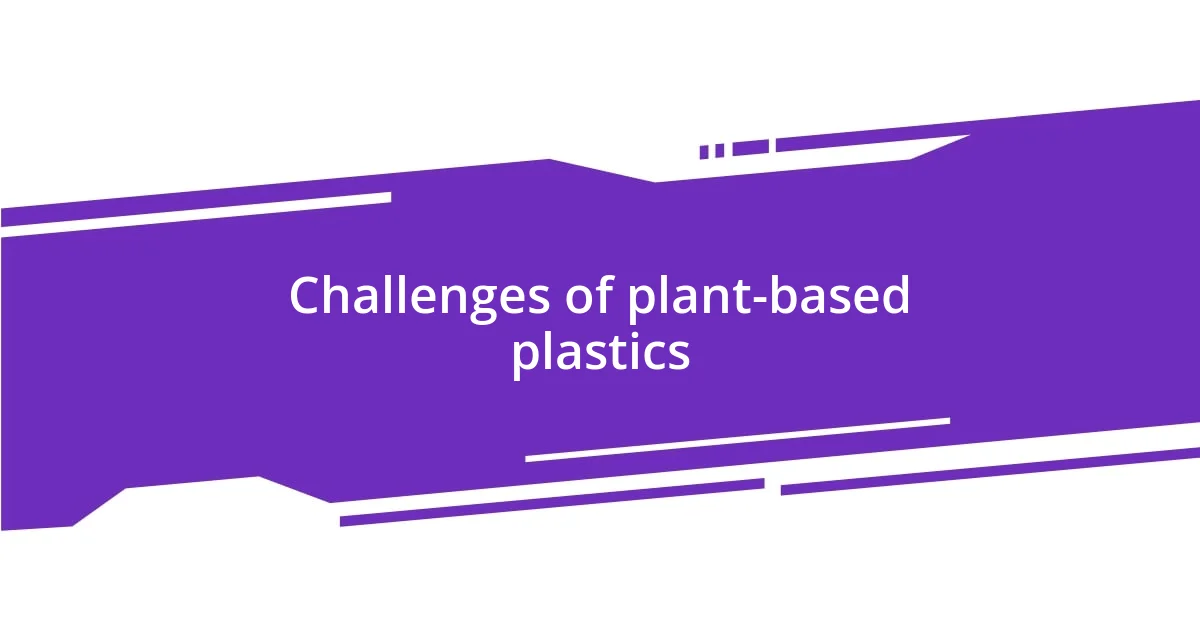
Challenges of plant-based plastics
Navigating the world of plant-based plastics isn’t without its hurdles. One challenge that struck me during my exploration is the perception that these materials are often less durable than their petroleum-based counterparts. I remember feeling a bit skeptical as I picked up a plant-based food container. Would it hold up as well as the typical plastic? It took a few uses, but I discovered that while some products may indeed be less sturdy, many are crafted to meet high standards of quality. It made me realize that consumer education is vital; we need to understand that not all plant-based plastics are created equal.
Another significant challenge is the availability of these materials. In my quest to become more eco-conscious, I found myself frustrated while searching for plant-based options at local stores. I encountered shelves filled with traditional plastics, overshadowing the few sustainable choices. This scarcity can limit our ability to make environmentally friendly decisions, raising the question: How can we encourage more businesses to stock these alternatives? It’s a community effort, and I believe that raising awareness can drive demand for wider availability.
Lastly, I can’t overlook the complexities of recycling plant-based plastics. I learned during a recycling workshop that many municipalities struggle to process these materials effectively. This inconsistency made me reflect on my own habits—was I appropriately disposing of my biodegradable items? It highlighted a critical gap in our waste management systems, reminding me that just because something is plant-based doesn’t mean it will automatically be recycled correctly. It became clear to me that for these products to thrive, we need comprehensive solutions in waste disposal that meet the unique characteristics of plant-based plastics.
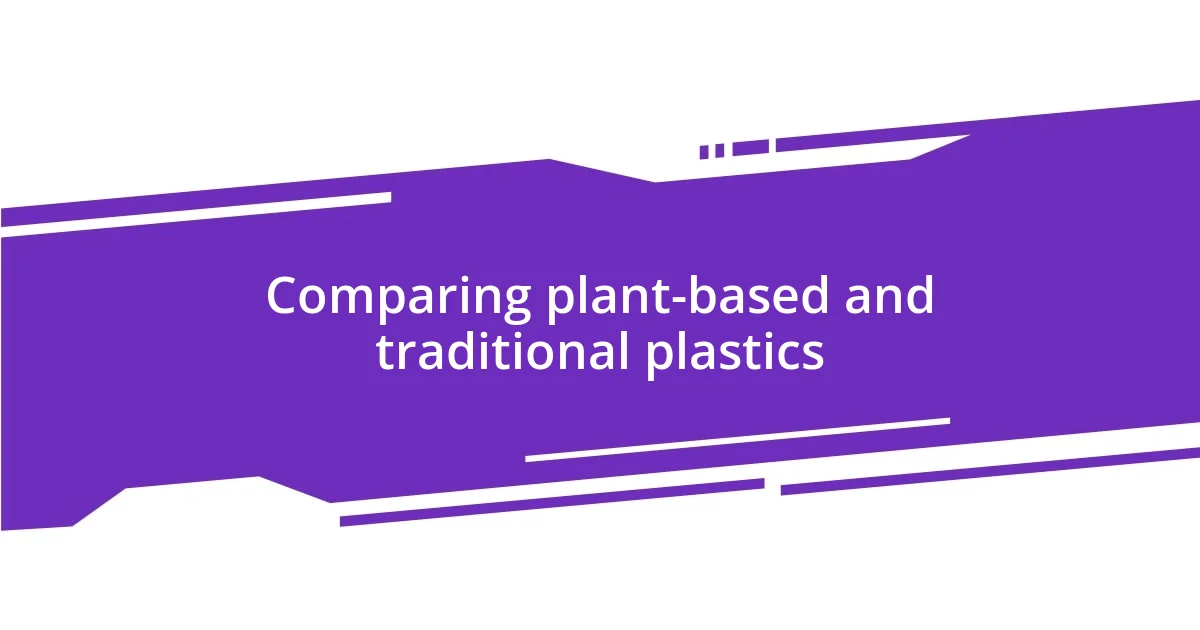
Comparing plant-based and traditional plastics
When it comes to comparing plant-based and traditional plastics, one major difference lies in their environmental impact. I remember walking through a park one day and noticing how much litter there was, mostly made from conventional plastic. This experience left me feeling disheartened; it drove home the point that traditional plastics not only take hundreds of years to decompose but also contribute significantly to pollution, clogging our oceans and harming wildlife. In contrast, plant-based plastics break down more quickly, which gives me hope for a cleaner future.
I’ve also found that the production processes of these materials can greatly influence their overall sustainability. While traditional plastics are often derived from fossil fuels, leading to higher carbon emissions, plant-based options are made from renewable resources. This insight reminded me of the joy I felt when learning how my choices could help reduce my carbon footprint. It was almost like a light bulb moment: using plant-based plastics can lead to a much smaller environmental impact. Can you imagine the difference we could make if more people made this switch?
However, it’s not all black and white. My encounters with both types of plastics revealed that traditional plastics often have a reputation for strength and durability, which can cast a shadow over plant-based alternatives. I once tried using a plant-based water bottle on a hike, only to find it didn’t hold up as well as I had hoped. This led me to wonder: Is it realistic to expect these new materials to meet the same performance standards? It’s a complex relationship, and while plant-based plastics have tremendous potential, we must address such concerns to fully embrace their benefits.

My personal usage experiences
I’ve been experimenting with plant-based plastics in my daily life, and it’s been quite the journey. For instance, I purchased a plant-based phone case; I was initially excited but soon felt disappointed when it started to show wear and tear much quicker than my previous plastic cases. It made me think, is this what we can expect from sustainable options? Sometimes, I wonder if my commitment to eco-friendliness might not fully align with product reliability.
At one point, I decided to host a small gathering and used biodegradable plates and utensils. I still remember the look on my friends’ faces—there was a mix of curiosity and skepticism. Some were surprised that these products felt substantial, while others were quick to comment on how they missed the heft of traditional plastic. This experience left me feeling a bit conflicted; it confirmed that while plant-based options are making strides, we’re still on a long path toward complete acceptance and trust.
When it comes to grocery shopping, I have found myself frequently reaching for plant-based packaging whenever possible. I recall a particular trip when I found a brand of pasta in a plant-based wrapper. I was filled with a sense of triumph! However, I started to ponder—how many other items are still locked in traditional packaging? This realization pushed me to engage more with local producers, driving home the importance of community in shifting consumer habits toward more sustainable choices.
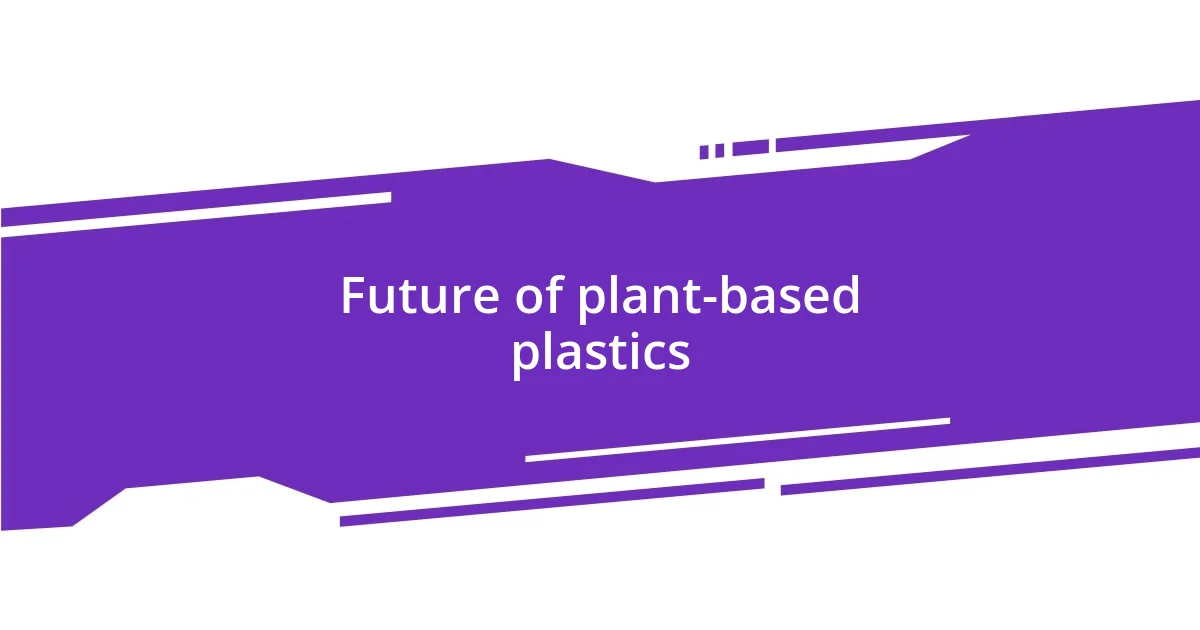
Future of plant-based plastics
As I look towards the future of plant-based plastics, one aspect that excites me is the ongoing innovation in this field. Recently, I read about a breakthrough in engineering stronger biodegradable materials that could potentially rival traditional plastics. It got me thinking—if we can create plant-based alternatives that meet the durability standards we expect, wouldn’t that completely shift the conversation around sustainability? It feels like we’re on the brink of a revolution in materials science.
Moreover, I can’t help but reflect on how consumer demand will shape the future of these alternatives. There’s a growing awareness of environmental issues today, and that shift in consciousness is palpable. I remember chatting with friends at a recent eco-friendly market, and several shared their commitment to seeking out products that minimize waste. This collective mindset could drive manufacturers to prioritize plant-based options, making them more mainstream rather than just a niche choice. Isn’t it invigorating to think our voices can actually influence the industry?
Another intriguing possibility lies in biocompatibility—how these materials might eventually integrate into existing recycling systems. Reflecting on my own experiences with recycling, I often found the process confusing and overwhelming. Can you relate? I dream of a future where plant-based plastics not only decompose naturally but can also be seamlessly recycled alongside traditional materials. Envisioning that kind of circular economy gives me hope that we can create a sustainable future without sacrificing the convenience of modern life.











